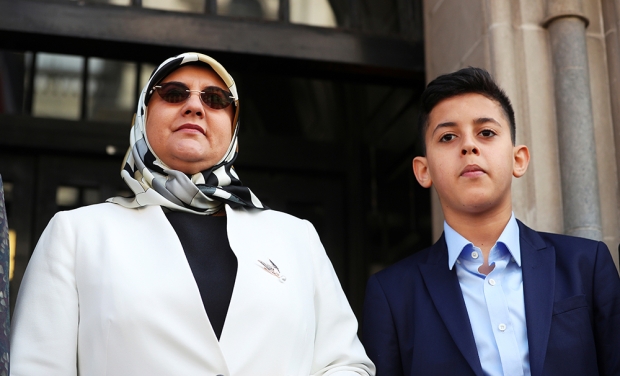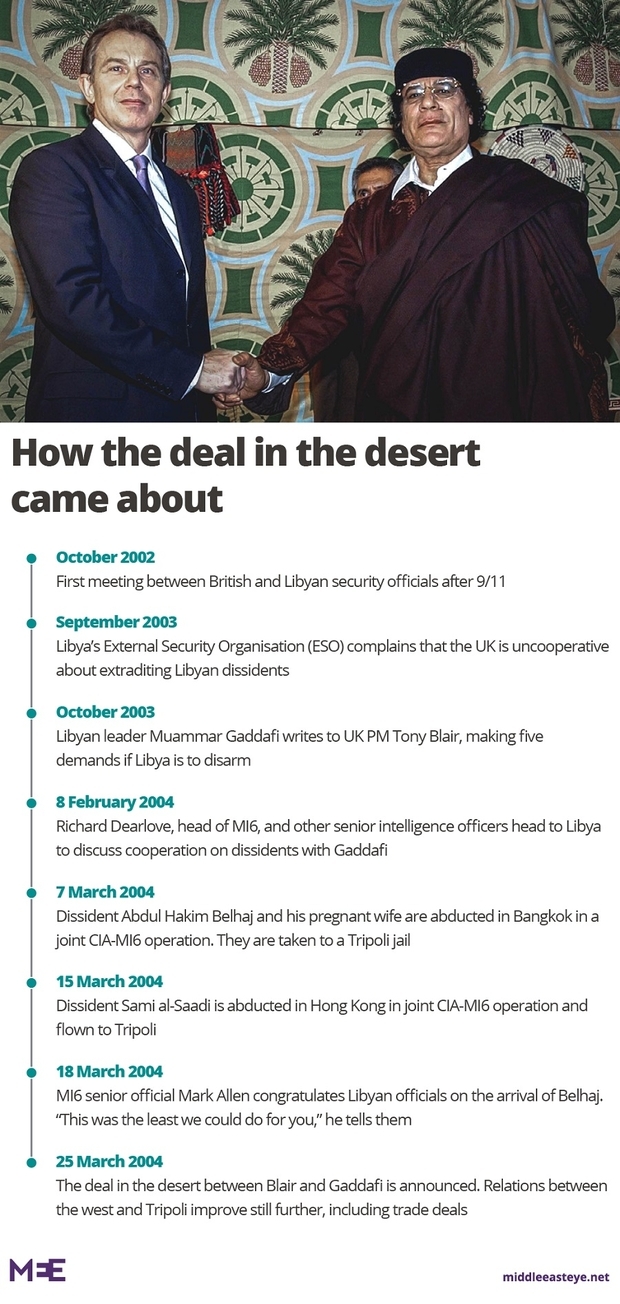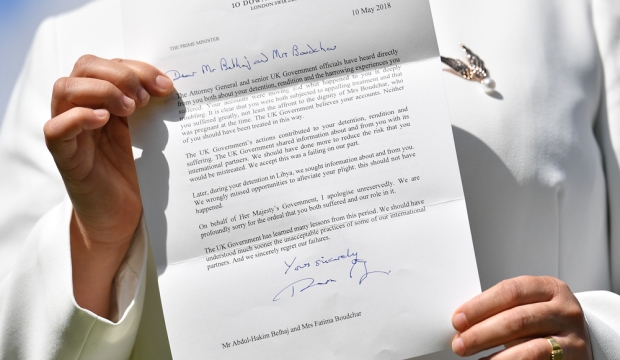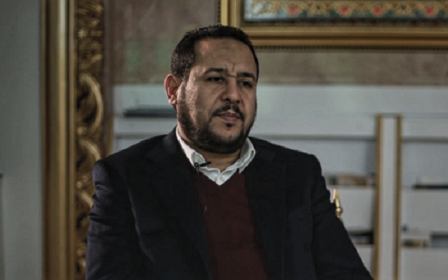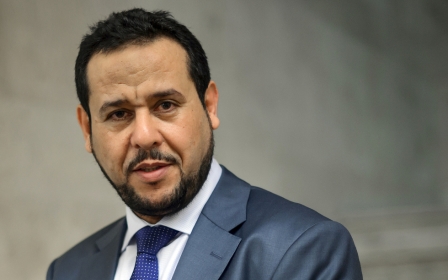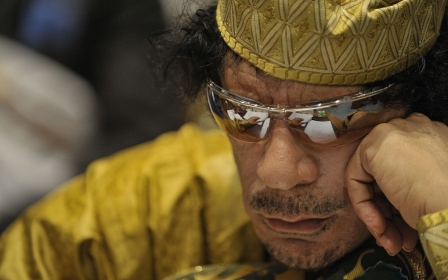British government apologises to Libyan dissident Belhaj over rendition
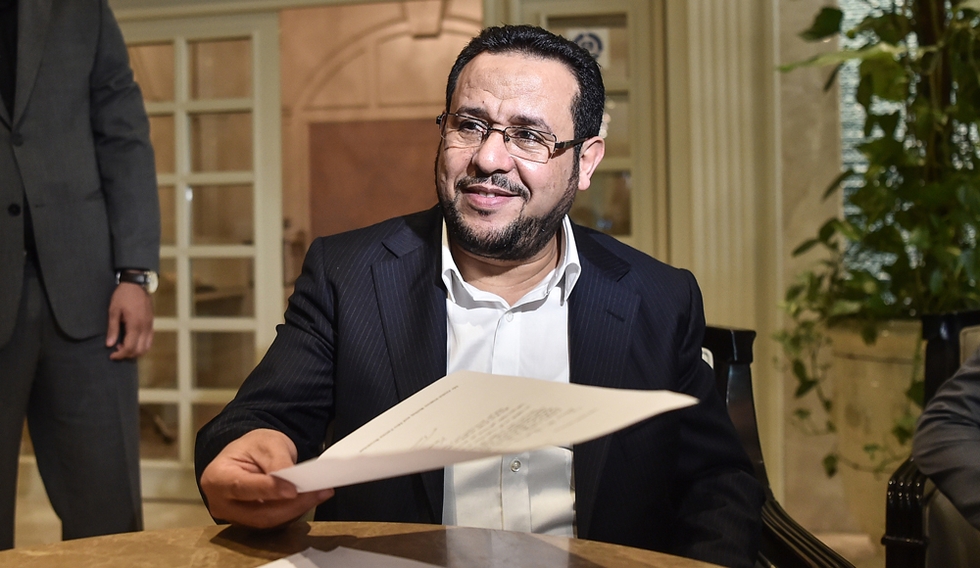
The British government on Thursday apologised “unreservedly and unequivocally” for its role in what it called the “appalling treatment” of Abdel Hakim Belhaj, a leading opponent of the former Libyan leader Muammar Gaddafi, and his pregnant wife, Fatima Boudchar.
They were seized and detained in 2004 in a secret operation carried out by the CIA based on information provided by the British foreign intelligence agency, MI6, and flown to Tripoli where they were subsequently tortured.
With Boudchar and her teenage son Abderrahim watching from the public gallery, Jeremy Wright, the UK's attorney general, announced that the government had reached a “full and final settlement” with Belhaj and his family, including a payment of £500,000 ($675,000) in compensation for Boudchar.
Significantly he also said the deal included “no admission of liability”, leaving a huge question mark over who was responsible for the rendition of Belhaj from Bangkok to Tripoli in 2004, a time when Britain’s Labour government under then-prime minister Tony Blair was developing a close and lucrative relationship with Gaddafi.
The UK government should have understood much sooner some of the unacceptable practices of our international partners and we sincerely regret our failures
British Prime Minister Theresa May
British government officials who did not want to be identified told this reporter that the rendition operation was a “ministerially authorised government policy”, while Richard Dearlove, head of MI6 at the time, has said: “It was a political decision, having very significantly disarmed Libya, for the government to cooperate with Libya on Islamist terrorism.”
Dearlove, led a high-powered delegation to discuss close cooperation with Gaddafi and his security chiefs shortly before the abductions of Belhaj, Boudchar and Saadi, according to British court documents.
Jack Straw, then the foreign secretary responsible for MI6, told MPs in 2005 that “there is simply no truth in the claims that the United Kingdom has been involved in rendition full stop.”
After evidence of direct British involvement in the rendition operation emerged, Straw said: “No foreign secretary can know all the details of what its intelligence agencies are doing at any one time.”
In a statement on Thursday, Straw said he welcomed the withdrawal of proceedings that had been brought against him by Belhaj and Boudchar.
"I recognise that the events they describe will have been deeply distressing for them," Straw said.
“As foreign secretary I was responsible for approving or authorising a wide range of matters to protect our national security, including by meeting our international obligations to share information with international partners.
"I took these responsibilities very seriously. As I have said on many occasions I sought to act at all times in a manner which was fully consistent with my legal duties, and with national and international law.”
MEE understands that MI6 sought assurances from Moussa Koussa that Belhaj and Saadi would not be mistreated.
Wright told MPs that “cultural” and behavioural” changes in MI6 and its sister agency, Britain’s domestic Security Service, MI5, and said changes in their “systems” were needed and were taking place.
That was a damning admission given that the government knew soon after the 9/11 attacks on the US in September 2001 that the CIA was engaged in rendition and torture.
'Profoundly sorry'
Wright said that British Prime Minister Theresa May had written to Belhaj in a letter which referred to his and Boudchar’s “deeply troubling and appalling treatment”.
"On behalf of Her Majesty’s Government I apologise unreservedly. We are profoundly sorry for the ordeal you both suffered and our role in it," the letter said.
"The UK government should have understood much sooner some of the unacceptable practices of our international partners and we sincerely regret our failures."
May also told Belhaj there were "missed opportunities" and said she regretted that the British government had not done more to "alleviate your plight".
“With the benefit of hindsight” the UK’s security and intelligence agencies were not prepared for the actions and practices of its partners and in future ministers would ensure they were consulted in risky operations, it said.
Belhaj had always insisted he would settle for just £1 in compensation and an apology from the British government.
In an interview with Middle East Eye last year, Belhaj said: "If the British government or those involved admit to what has happened and apologise I am happy to end it like that."
Handed the letter of apology at the British consulate in Istanbul, the Turkish city where he is currently based, Belhaj said: “I welcome and accept the prime minister’s apology, and I extend to her and the attorney general my thanks and sincere goodwill.”
Fatima Boudchar, speaking in London, said: “I thank the British government for its apology and for inviting me and my son to the UK to hear it. I accept the government’s apology."
'Lines that must not be crossed'
Sapna Malik from law firm Leigh Day who represented the couple said: “Today’s historic occasion is a tribute to the resilience of our clients in their quest for justice. After six long years of litigation, [the government] has rightly acknowledged that, even in the fields of counterterrorism and international relations, there are lines which must not be crossed and which were crossed here, with devastating consequences for my clients.
“Today’s candid apology helps restore the humanity and dignity so brutally denied to my clients during their ordeal and is warmly welcomed.”
Cori Crider, Reprieve counsel to the family said: “This is not just Abdel Hakim and Fatima’s victory. It is a victory for everyone who opposes injustice, secret detention and torture.
”Sonya Sceats, chief executive of Freedom from Torture campaign group, said: “We welcome the public apology from the attorney-general but it must be the beginning not the end of a proper accounting for the sinister pattern of UK complicity in the years after the 9/11 attacks.
“Abdel Hakim Belhaj and Fatima Boudchar are an inspiration to torture survivors everywhere for their courage and principled pursuit of justice but they should never have had to fight this hard for an official apology.
“There can be no defence of torture and the wider lessons from such shameful lapses must be learned to guard against a repetition. It is vital that today's announcement is followed by a comprehensive truth-telling in line with the UK's unbreakable legal obligations to investigate torture and hold those responsible to account.
“It is even more urgent that the government goes ahead with the judge-led inquiry into UK involvement with torture as promised by David Cameron in 2010 and later passed to the parliamentary intelligence and security committee."
Ken Clark, Conservative member of parliament and chair of the all-party parliamentary group on extraordinary rendition, said: "It is truly shocking that Britain has been involved in kidnap and torture. The practice of extraordinary rendition is contrary to fundamental human rights and long-held British values."
He said the intelligence and security committee needed to fulfil its "promise to investigate what went wrong and why in this and other cases".
Kate Allen, Amnesty International UK’s director, welcomed the British government’s acceptance it was involved in the terrible abuse. However she added: “For years the UK Government has tried to keep this case behind closed doors and close it down, apparently fearful of what evidence of the UK’s complicity in kidnapping and torture might emerge.
"Even now, despite the perseverance and bravery of Mr Belhaj and Ms Boudchar in seeking an apology, we still don’t know the full facts in this deeply-troubling affair.”
Allen continued: “The wider issue is that we’ve still never had the judicial inquiry into the UK’s role in torture carried out by its partners - including the CIA’s extensive programme of rendition and illegal detention - that we were promised under David Cameron’s government. The government once claimed that only an independent, judicial inquiry is capable of exposing the truth over the UK’s role in the torture of detainees. We still need to know the truth.”
Hooded and shackled
Belhaj, a military commander and former political activist, and Boudchar, who is Moroccan, were detained in China in March 2004 as they were about to take a flight to the UK to claim asylum.
Instead they were deported to Malaysia, from where they flown to Bangkok in Thailand and handed over to the CIA, which flew them to Tripoli.
Belhaj was hooded and shackled to the floor in a stress position and the then pregnant Boudchar was bound tightly by tape during the 17-hour flight to Libya, where they were subsequently tortured by Gaddafi’s security forces.
A fellow member of the Libyan Islamic Fighting Group, Sami Al-Saadi, was also rendered fron Hong Kong to the Libyan capital in an MI6-CIA operation. He, too, was tortured, later accepting compensation of £2.2 million ($3m) from the British government.
Belhaj was questioned by MI6 after MI5 sent a list of questions to ask him when he was held, for long periods in solitary confinement, in Tripoli’s Tajoura jail.
At the time of the rendition operation, Mark Allen, the head of MI6's counter-terrorism unit in 2004, in correspondence with Gaddafi's intelligence chief, Moussa Koussa, took credit for MI6's work. In a fax sent by him to Libyan authorities in March 2004, he said that it was British intelligence which should take credit and reap the rewards for Belhaj's abduction.
In the letter, Allen congratulated Koussa on the “safe arrival” of Belhaj. “This was the least we could do for you and for Libya to demonstrate the remarkable relationship we have built over recent years.”
He added that “amusingly”, the CIA – which had provided the aircraft for the rendition operation – had asked that MI6 channel all requests for information from Belhaj through them.
“I have no intention of doing any such thing. The intelligence … was British. I know I did not pay for the air cargo. But I feel I have the right to deal with you direct on this.”
'Deal in the desert'
Two weeks after the couple were renditioned to Libya, Tony Blair paid his first visit to the country, embracing Gaddafi in the so-called "deal in the desert" and declaring that Libya had recognised “a common cause, with us, in the fight against al-Qaeda extremism and terrorism”. In London, the Anglo-Dutch oil company Shell announced it had signed a lucrative contract for gas exploration rights in Libya.
British government officials who did not want to be identified told this reporter that the rendition operation was a “ministerially authorised government policy”, while Richard Dearlove, head of MI6 at the time, has said: “It was a political decision, having very significantly disarmed Libya, for the government to cooperate with Libya on Islamist terrorism.”
Thursday’s statement by Wright shed no light on who was responsible for the rendition of Belhaj and his family.Four-year police investigation
After a four-year police investigation, Britain’s Crown Prosecution Service announced that neither Straw nor Allen would face charges because of insufficient evidence although Allen had “sought political authority for some of his actions albeit not within a formal written process nor in detail...”
In a carefully worded statement the CPS added: “There is sufficient evidence to support the contention that the suspect had been in communication with individuals from the foreign countries responsible for the detention and transfer of the Belhaj and Saadi families; disclosed aspects of what was occurring to others within this country; and sought political authority for some of his actions albeit not within a formal written process nor in detail which covered all his communications and conduct."
However, the CPS went on: "Officials from the UK did not physically detain, transfer or ill-treat the alleged victims directly, nor did the suspect have any connection to the initial physical detention of either man or their families."
An indication that the police believed they had sufficient evidence for a criminal prosecution in what they called Operation Lydd is clear from a little-noticed answer to a question put to London Mayor Sadiq Khan in October 2016.
“The Metropolitan Police submitted a comprehensive file of evidence (in excess of 28,000 pages) to the Crown Prosecution Service seeking to demonstrate that the conduct of a British official amounted to Misconduct in Public Office”, Khan said.
The British government's apology comes with the CIA's rendition and torture programme in the 2000s under scrutiny following US President Donald Trump's nomination of Gina Haspel, who once ran a CIA 'black site' in Thailand as head of the CIA.
In an article in the New York Times earlier this week, Boudchar said that the worst treatment she had received had been in a CIA prison in Thailand.
"I was abducted from exile in Southeast Asia and secretly jailed in one of Libya’s worst dungeons. But the worst torture of my life wasn’t done to me by Col. Muammar Gaddafi's thugs. It was done in Thailand at the hands of the CIA," Boudchar wrote.
New MEE newsletter: Jerusalem Dispatch
Sign up to get the latest insights and analysis on Israel-Palestine, alongside Turkey Unpacked and other MEE newsletters
Middle East Eye delivers independent and unrivalled coverage and analysis of the Middle East, North Africa and beyond. To learn more about republishing this content and the associated fees, please fill out this form. More about MEE can be found here.


